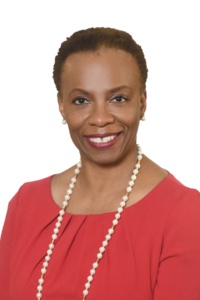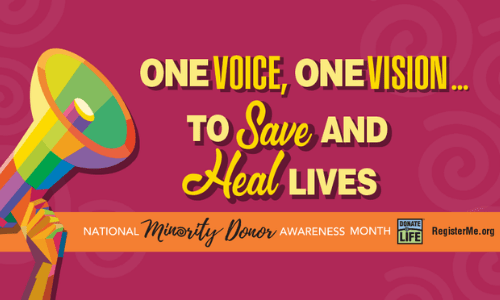
CONTACT:
MEDIA@AOPO.ORG
National Minority Donor Awareness Month
Marion Shuck, President of the Association for Multicultural Affairs in Transplantation (AMAT)

- Briefly describe yourself and the role you play at your organization
Gift of Hope Organ and Tissue Donor Network is the regional organ procurement organization for ¾ of Illinois and Lake County, Indiana. I am currently the Director of Donor Family Service and Community Outreach. My teams are specifically responsible for taking care of donor families after the loss of their loved, but more importantly after their generous gift of a second chance of life to someone else. The community outreach team is responsible for disseminating information to our community at large about the importance of participating in the organ and donation process. - As an African American woman, what did your path to this position look like? What struggles or challenges did you face during your career?
I started at Gift of Hope 11 years ago in HR, managing the recruitment process for the organization. Six years ago, I transferred over to Community Affairs to work with Jack Lynch and manage the community outreach program. Then 20 months ago I was promoted to Director, DFS and CA. Some of the challenges I’ve experienced have stemmed from being seen as too direct, too strong and too smart, when I’ve communicated concerns or addressed issues, some people tend to label Black women as angry instead of valuing our opinions and input. Often, I have been seen as intimidating and have been told I have to lighten up, and not be the smartest person in the room, assimilate or adjust to fit into culture and environments instead of being accepted for my strengths. - What advice would you give to someone looking to advance their career in the organ donation industry?
If you are a person of color, join AMAT or an organization where you can grow. I joined AMAT 8 years ago and was mentored from day. I started as a committee member, committee Chair, Board member and now current President. AMAT provided me the opportunity to hone my leadership skills and use them within my own organization. Also find a mentor and sponsor. AMAT’s Mentoring program is providing that opportunity to formally help our members be ready for opportunities to gain leadership skills and get promoted in their organizations. My boss Jack Lynch was a staunch advocate and mentor for me, but in these days you need a sponsor to catapult you into senior leadership. For me that person was my CEO, Kevin Cmunt, as he met with me monthly to understand organizational culture, but more importantly harness my strengths. As the current President of AMAT, I am committed to elevating the voices of all multicultural communities and suggest people remain true and authentic to themselves. We all may have unconscious bias, but is imperative to kind to each other. - What does National Minority Donor Awareness Month mean to you? What do you think are the most important takeaways for this month?
National Minority Donor Awareness Month means to me that not only do we highlight the need for minority donors, we recognize and celebrate the lifesaving contributions of minority organ and tissue donors, their families, minority transplant recipients and the healthcare professionals who enable the gift of hope through donation and transplantation. The important takeaway is there are a lot of myths and misconceptions that these communities won’t donate. Its not that they won’t donate, it is about how we frame the conversation with them and how we honor their loved ones lives. We need to be very intentional on how we plan for our interactions with multicultural families and how we help them create a lasting a legacy. - What efforts should be taken in order to promote organ, eye and tissue donation among multicultural groups? How can OPOs and other organizations play a role in these efforts?
Traditionally, OPO’s tend to hire diverse employees to work in communities, and that is important that employees represent the communities we serve, however, we must be intentional about outreach so that is honors the good, bad and ugly of donation. We have to speak to the mistrust that families have and show them the truth about donation, so they can understand the process of donation and the help they can provide other communities of color. We have to be intentional in speaking with families and not “at” families. Be intentional about not letting bias show when having to work with multicultural families. Work with hospitals in creating a positive culture for donation, so families can feel they will be listened to and not as just a means to donation. - How can organizations ensure they have a diverse candidate pool and incorporate diversity and inclusion into the workplace?
Be intentional about finding and hiring a diverse employees, be intentional about promoting their diverse employee and don’t hide behind excuses that they can’t find diverse candidates. Recruit outside the box, ask your diverse employees if they have friends and family that would make good co-workers. Use resources like below:- Blackjobs.com, Blackcareernetwork.com
- Latprocom
- Illinois Black Chamber of Commerce
- Illinois Hispanic Chamber of Commerce
- Black and Hispanic Nursing Associations
- Historically Black Colleges and University Alumni Associations, particulary, Howard University, Meharry Medical College, Morehouse Medical School, Fisk University, etc. These are some of the top colleges in the country.
###
National Minority Donor Awareness Month is a collaborative initiative of the National Organ, Eye and Tissue Donation Multicultural Action Group to save and improve the quality of life of diverse communities by creating a positive culture for organ, eye and tissue donation. National Minority Donor Awareness Month stems from National Minority Donor Awareness Week, founded in 1996 by the National MOTTEP to bring heightened awareness to donation and transplantation in multicultural communities – focusing primarily on African American/Black, Hispanic/Latinx, Asian Pacific Islander and American Indian/Alaskan Native communities.
The National Multicultural Action Group includes the Association for Multicultural Affairs in Transplantation(AMAT), Association of Organ Procurement Organizations (AOPO), Donate Life America (DLA), Health Resources & Services Administration (HRSA), National Minority Organ Tissue Transplant Education Program (MOTTEP) and National Kidney Foundation (NKF).

